How to Create an Enterprise App Store to Manage Work Apps?
In today's rapidly evolving business landscape, a wide array of devices is seamlessly integrated, including mobile devices, tablets, digital signage, and self-service kiosks.
A primary concern is -- how to efficiently deploy and manage necessary apps on these devices. Given the size of the device fleet, manual configuration is clearly out of the window. That is why businesses need an Enterprise App Store designed specifically to install and regulate work apps.
In this article, we will go through what is Enterprise App Store and how do you create one with AirDroid Business MDM to help you streamline application deployment and management.
- Part 1 : What is an Enterprise App Store?
- Part 2 : Uses of an Enterprise App Store
- Part 3 : How to Create One with AirDroid Business MDM?

- Part 4 : Benefits of Enterprise App Store Solutions
- Part 5 : Challenges in Managing Company Apps
- Part 6 : Adopting Application Management Features in MDM Solutions
- Part 7 : Conclusion
- Part 8 : Common FAQs
1What is an Enterprise App Store?
An Enterprise App Store is a private platform for employees to access, download, and install company-approved apps, empowering employees to work smarter and more efficiently.
From a company's standpoint, an enterprise app store allows enterprises to gain greater operational control over the apps used in the workplace. It helps IT to exercise distribution and personalize app downloads and usage based on departments, roles, and hierarchies.
2Uses of an Enterprise App Store
An enterprise app store extends to benefit both internal employees and customers. For example, in the retail industry, where it can provide a self-checkout machine for customers and a point of sale (POS) system for employees.
Customers can scan and pay for their items using the self-checkout kiosks, saving their time and reducing the need for long queues at the checkout counter. This convenience can greatly enhance the overall shopping experience.
For employees, they can use the designated app on their devices to process transactions, manage inventory, and generate sales reports. It streamlines the sales process, improving overall efficiency as employees have access to all necessary tools and information in one place.
With an enterprise app store, employees can easily download and update the POS app or self-checkout kiosks, making sure they always have the latest features at their fingertips.
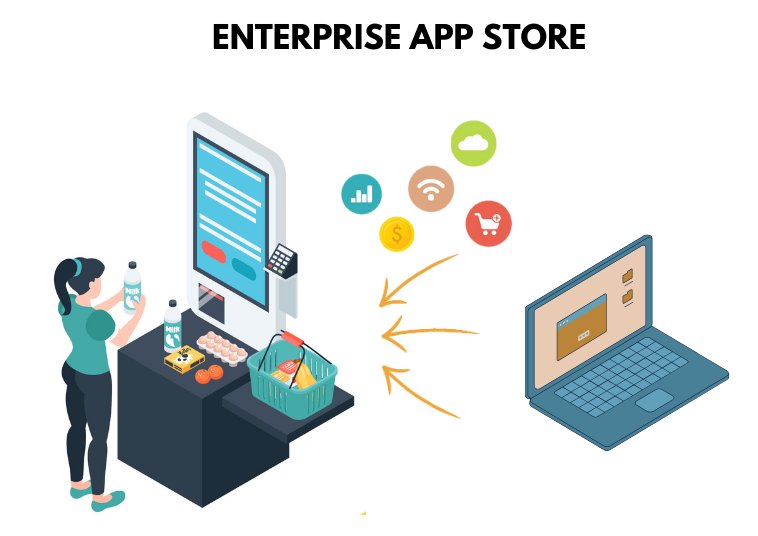
3How to Create One with AirDroid Business MDM?
You can create an enterprise app store with AirDroid Business by utilizing its feature called Application Management Services (AMS).
To add private apps to the Organization App Library, follow these steps:
- Step 1:From the Admin Console>Select “Apps” >Click “App Library” >Choose “Organization App Library” >Click “Add App”.
- Step 2: Upload your APK files by either dragging and dropping or clicking "click to upload".
- Step 3: After the upload is completed, you need to add app details, graphic assets, and screenshots for your app. Click “Next” after the application is uploaded.
- Step 4: You can customize the language setting. The default language is English (United States, en-US). If your application only supports English, you don't need to change the language and jump to Step 7.
- Step 5: If your application supports multiple languages, choose “Add languages”.
- Step 6:Select languages for specific locations so that users from those locations will be able to use the translated version.
- Step 7:Click “To Acquire from Google Play” to autofill details. Otherwise, manually fill in General Information and Graphic Assets.
- Step 8:Fill in “App Name”, “Short Description”, and “Full Description” of your application.
- Step 9:Upload the App Icon in PNG format (512 x 512, 32-bit PNG).
- Step 10:Add Phone and Tablet Screenshots by clicking “+”. (JPG, JPEG, or 24-bit PNG, with minimum 320px dimension and maximum 3840px dimension)
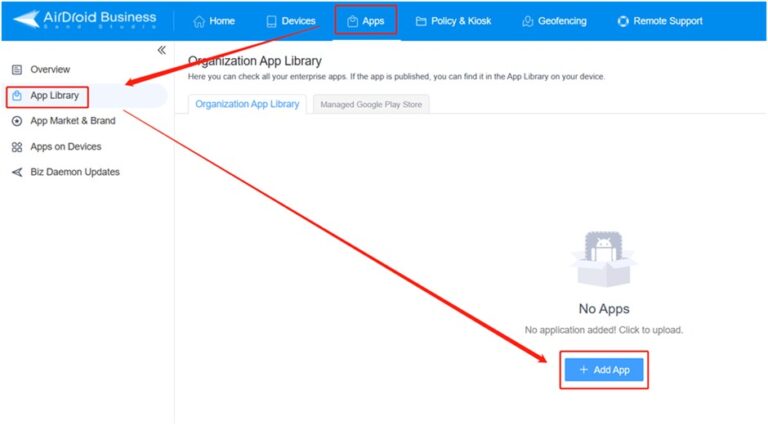
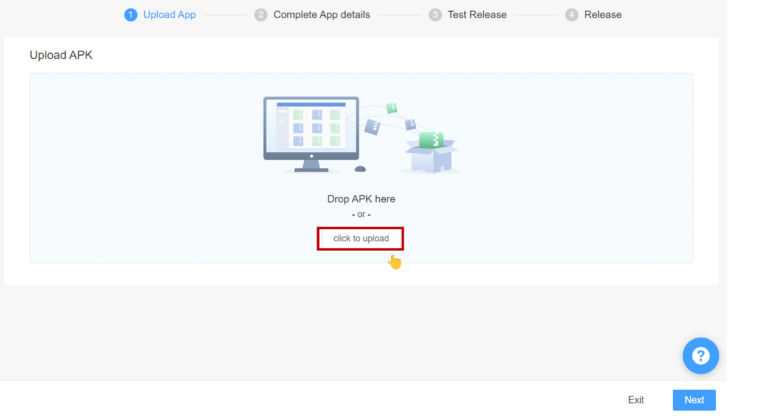
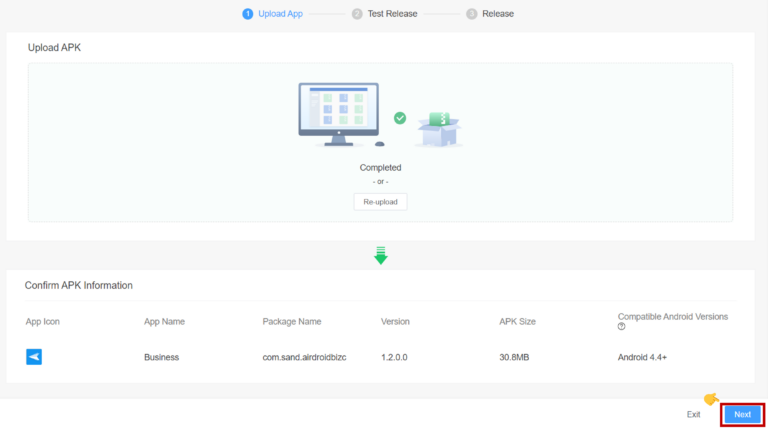
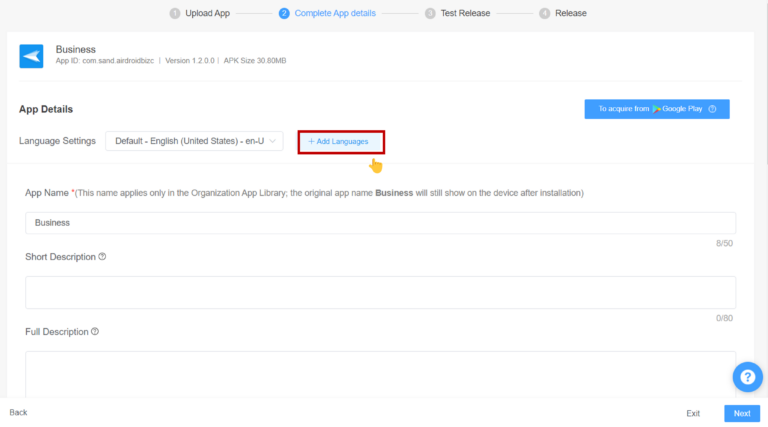
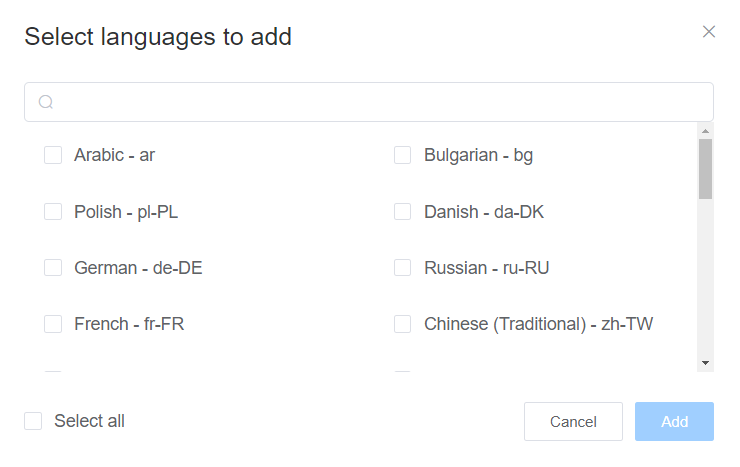
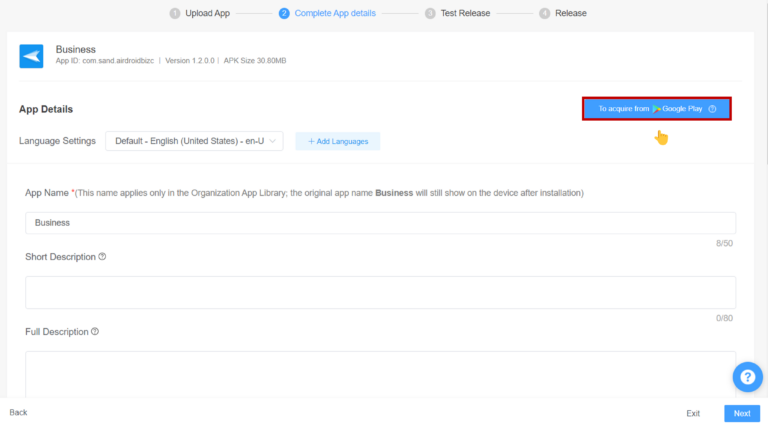
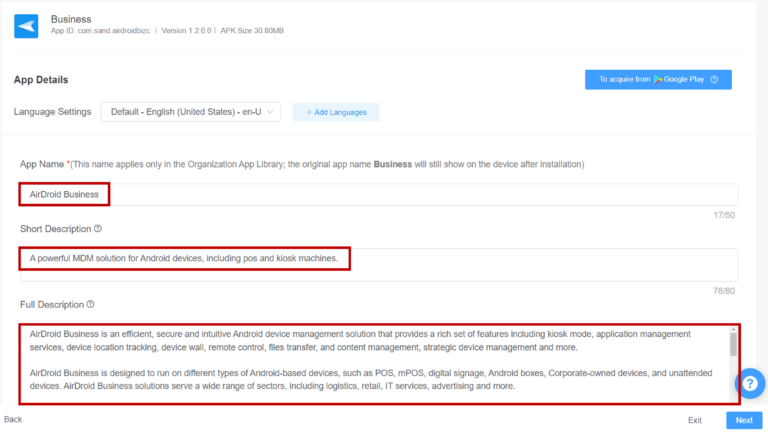
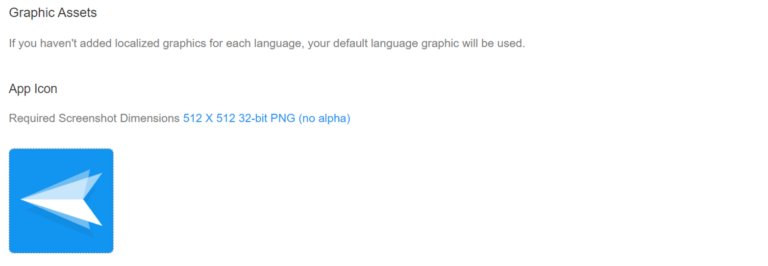
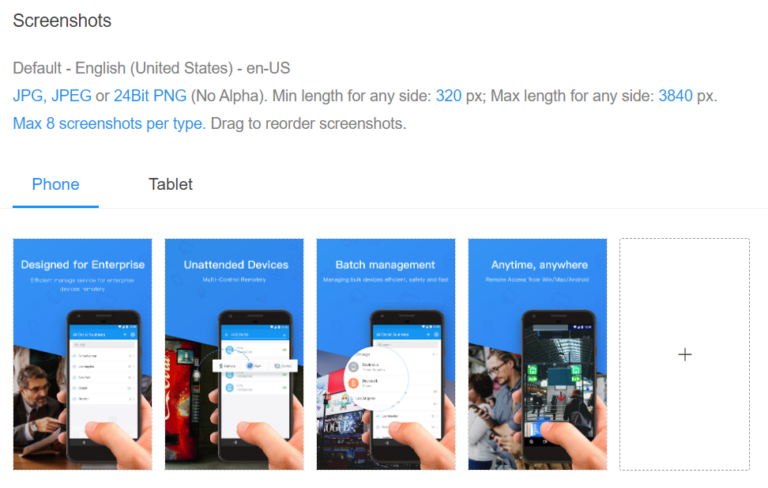

How to Install Apps from Managed Google Play Store?
- Step 1:From the Admin Console, select “Apps” >Click “App Library” >Choose “Managed Google Play Store” > Tap “+Add app”.
- Step 2: Select apps from Featured Apps or perform a search. Tap Select to proceed.
- Step 3: Choose devices for Test Release and Formal Release.
- Step 4: Check Release History for Version to confirm app installation on the device.
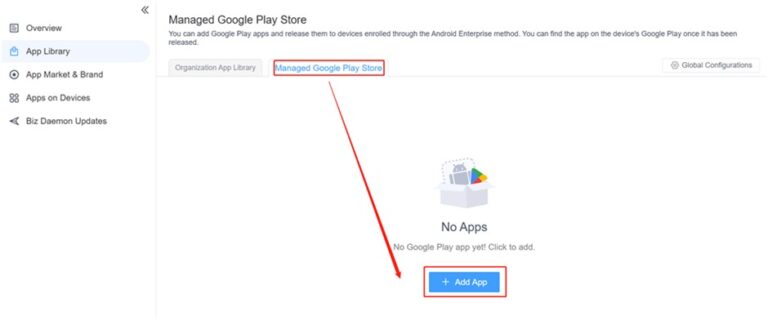
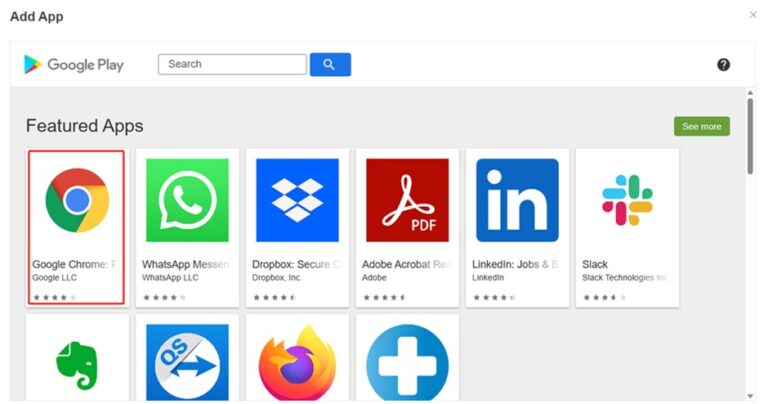
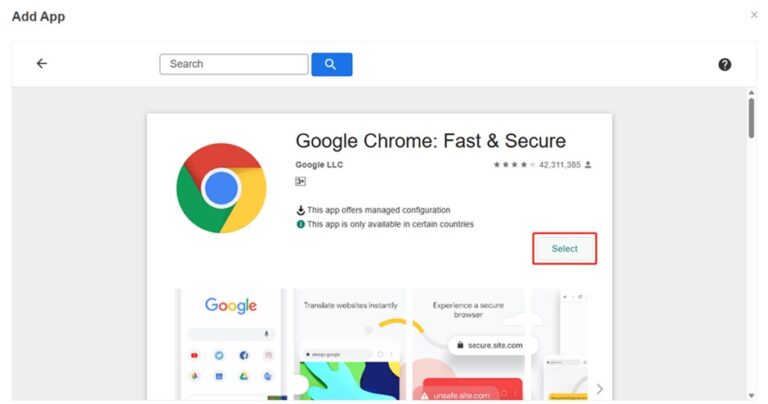
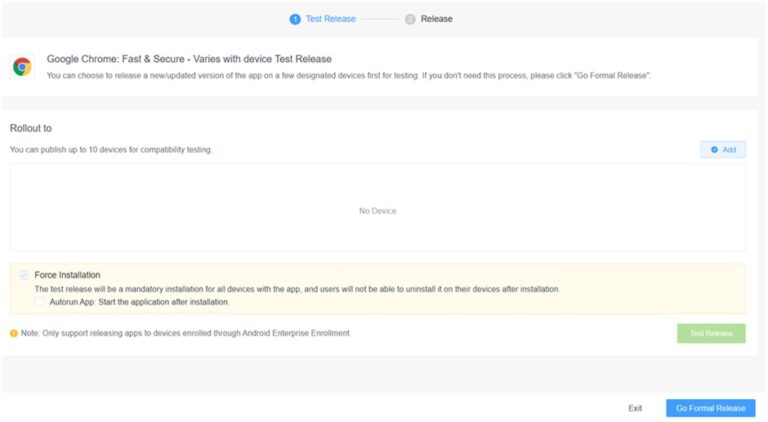
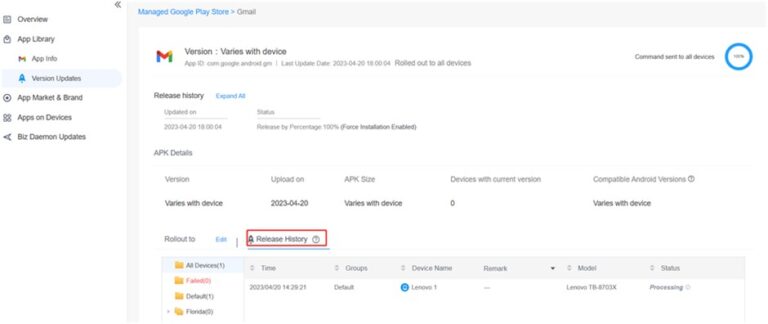
4Benefits of Enterprise App Store Solutions
Implementing an enterprise app store can bring numerous benefits to your organization, such as:
Centralized app management
Enterprise app stores are like organized hubs that make important tasks much easier. They simplify things like updates, fixing problems, and keeping everything running smoothly.
Plus, these stores usually have tools that help IT support teams quickly find and fix issues, so employees can stay productive without long interruptions.
Customization for business needs
An enterprise app store provides the capability to tailor software solutions to meet specific business requirements. This means employees can access the tools that are directly relevant to their roles.
Regulatory compliance
In sectors like healthcare, managing medical and patient information is essential for complying with healthcare privacy regulations like HIPAA (Health Insurance Portability and Accountability Act).
Enterprise app stores are instrumental in this regard. They grant healthcare organizations the ability to equip devices with essential applications, so that patient data is accessed and shared in a secure and compliant manner.
Cost saving
The enterprise app store takes care of installing and updating software applications automatically, reducing the need for manual work.
This saves a lot of time and money, giving IT teams the freedom to focus on more important tasks rather than everyday upkeep.
5Challenges in Managing Company Apps
In this section, we would also like to highlight several common challenges in managing company apps:
📍 Keeping Apps Updated:
Keeping all apps up-to-date with the latest features and bug fixes across devices, especially when managed by employees with varying levels of IT knowledge, can be an overwhelming task.
Companies need a reliable way to quickly deal with technical problems, roll out updates consistently across different devices, and meet different needs and types, no matter where they are.
📍 Security Measures:
Securing apps from malware and other threats has always been a top priority. Without proper precautions, employees could unknowingly introduce harmful apps to company devices.
It may lead to data breaches, network compromise, or device crash. Hence, organizations should implement robust security measures to mitigate these risks.
6Adopting Application Management Features in MDM Solutions
To effectively address the challenges associated with managing company applications, many organizations have turned to Mobile Device Management (MDM) solutions.
Among them, AirDroid Business excels in its ability to handle app updates and security.
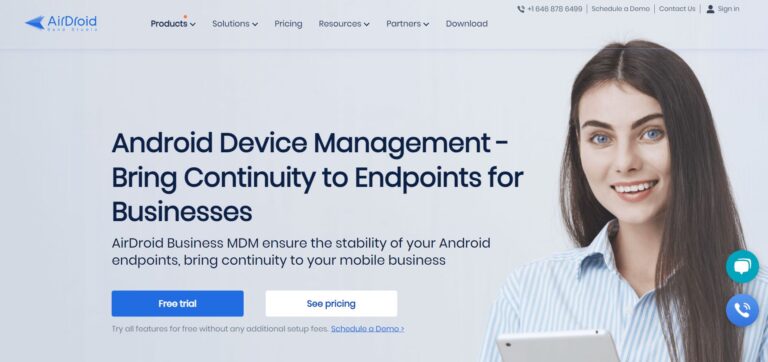
In a nutshell, AirDroid Business offers these key features for efficient app management:
• App Configuration
This empowers administrators to safeguard and standardize work-related apps by managing their settings and controlling user permissions simultaneously.
• Application-related alerts
This feature enables administrators to set up alerts for monitoring various aspects of app functionality, such as its running status, foreground app status, and cellular data usage.
When an alert is triggered, administrators receive immediate notifications and can take prompt action, including options like remote reboot, screen off, factory reset, and more.
• Support Google Play Store
With the Application Management Services feature, you can choose applications from the Managed Google Play Store to deploy on remote devices.
They also provide a protective barrier against unfamiliar app resources, creating a secure environment for employees to access work-related applications.
• Policy
With the blocklist/allowlist features, organizations can have precise control over which apps are allowed to run on devices. This helps meet their different needs for app control and prevents the installation of potentially harmful apps.
7Conclusion
In this digital era, integrating MDM with the enterprise app store can drive remarkable transformation within your company.
By offering a tailored selection of apps to meet your employees' needs, you can boost productivity and efficiency across the organization. The benefits of an enterprise app store, such as centralized app distribution, enhanced security, and improved visibility, make it a worthwhile investment for any company.
While challenges may arise, adopting application management features in AirDroid Business MDM can help you overcome them, providing a seamless app experience for your employees.
FAQs
Consumer apps, on the other hand, are chosen and managed by individuals for personal use and may not meet the same level of security and compliance standards required in a business environment.
These apps cater to a wide range of personal and entertainment needs, with a primary focus on user experience and potential monetization opportunities.
The enterprise app store maintains a vigilant eye on the deployment process, providing real-time alerts for prompt and informed decision-making.
This critical role guarantees that the right apps are available to the right users, all while maintaining the security and integrity of the organization's mobile ecosystem.





Leave a Reply.